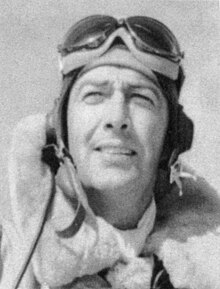Robert Taylor (actor, 1911)
Robert Taylor (born August 5, 1911 as Spangler Arlington Brugh in Filley , Nebraska , † June 9, 1969 in Santa Monica , California ) was an American film actor who became one of the most popular leading actors in Hollywood from the mid-1930s rise. He made more than 70 films.
Life
Taylor was the son of a country doctor. He wanted to study music and first enrolled as a music student at Doane University, but then followed his cello teacher at Pomona College . There he played in the local theater group in the role of the boy hero. The MGM talent scouts noticed him and brought him to the studio's drama school. In 1934 he was awarded a seven-year contract for $ 35 a week and made his film debut in A Wicked Woman that same year . Taylor stayed with MGM for over 24 years, with a single studio longer than any other movie star. Taylor played his first major role in Society Doctor in 1935 . In the same year he worked alongside Irene Dunne in the film adaptation of Magnificent Obsession , which made as much for his career as the 1953 remake for Rock Hudson . His rapid rise to the top star was so spectacular in the following year that the London newspaper The Observer wrote in its annual review: 1936 will be remembered as the year of the Spanish Civil War , the abdication of the English King and Robert Taylor.
The actor owed his popularity that year to appearances alongside Loretta Young ( Private Numbers ), Janet Gaynor ( small town girl ), Barbara Stanwyck ( His Brother's Wife ), Joan Crawford ( The Gorgeous Hussy ) and especially Greta Garbo , who he starred alongside in the movie Die Lady of the Camellias participated. The actor was next to Tyrone Power as the most beautiful actor of his time and was often disqualified by the critics. The studio therefore tried to use Taylor regularly in more down-to-earth roles, and he also shot many adventure films and westerns as a result. His mostly female fans, however, liked him best as the hero of romantic comedies and dramatic love stories. He performed well as a gangster in The Dead Lives and in Your First Husband with Vivien Leigh , his personal favorite film.
During the war he served as a lieutenant in the US Navy . In this role, he taught budding pilots and directed 17 US Navy training films as a director, most of which dealt with aviation. After the war, the actor was initially unable to build on his previous popularity. First appearances in lavishly produced period films like Quo Vadis? , Ivanhoe , The Knights of the Round Table and The Adventure of Quentin Durward helped him to new successes. He also appeared in many westerns , including Devil's Doorway , which presented him as an Indian who must fight against racial hatred and crime. Westward the Women tells the dramatic events of a group of women who, under Taylor's leadership, have to overcome many dangers on their way west. After the end of his contract with Metro-Goldwyn-Mayer, the quality of his movies began to decline, so that he founded his own production company, Robert Taylor Productions , and then starring Robert Taylor in the television series The Detectives, which he produced .
Taylor was a founding member of the Motion Picture Alliance for the Preservation of American Ideals , founded in 1944, and gave the names of actors who could be Communists before the committee of the Committee on Un-American Activities . As a supporter of the Republican Party , he supported the 1960 presidential campaign of Richard Nixon in 1966 in California the campaign of his friend Ronald Reagan .
Robert Taylor died of lung cancer in 1969 and was buried in the Forest Lawn Memorial Park in Glendale . The funeral speech was given by Ronald Reagan.
From 1939 to 1951 Taylor was married to Barbara Stanwyck for the first time ; the marriage remained childless. In 1954 he married Ursula Thiess , the couple had two children together.
Awards
- Golden Globe in 1954 as best male film star with Alan Ladd
- Star on the Hollywood Walk of Fame
- In 1970 he was inducted into the Hall of Great Western Performers of the National Cowboy and Western Heritage Museum .
Filmography
|
|
literature
- Jane Ellen Wayne: Robert Taylor: The Man with the Perfect Face. St. Martin's Press, New York 1989, ISBN 0-312-02972-1 .
- Dieter Machon: Robert Taylor. Eppe, Bergatreute 1998, ISBN 3-89089-686-3 .
- Lawrence J. Quirk : Films of Robert Taylor. Citadel Press, Secancus / New Jersey 1975, ISBN 0-8065-0667-9 .
Web links
- Robert Taylor in the Internet Movie Database (English)
- Pictures by Robert Taylor In: Virtual History
- Robert Taylor on prisma-online.de
- Robert Taylor in the nndb (English)
Individual evidence
- ↑ Robert Taylor. Retrieved May 14, 2020 (English).
- ↑ Robert Taylor. Retrieved May 14, 2020 (English).
- ^ Steven J. Ross: Movies and American Society. Wiley-Blackwell, Chichester 2002, ISBN 0-631-21960-9 , p. 197.
- ^ Reynold Humphries: Hollywood's Blacklists: A Political and Cultural History. Edinburgh University Press, 2009, ISBN 978-0-7486-2455-3 , p. 83.
| personal data | |
|---|---|
| SURNAME | Taylor, Robert |
| ALTERNATIVE NAMES | Brugh, Spangler Arlington (maiden name) |
| BRIEF DESCRIPTION | American film actor |
| DATE OF BIRTH | August 5, 1911 |
| PLACE OF BIRTH | Filley , Nebraska |
| DATE OF DEATH | June 9, 1969 |
| Place of death | Santa Monica , California |

